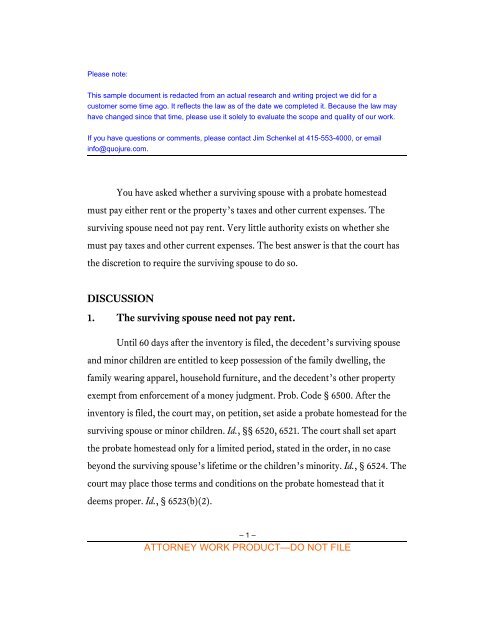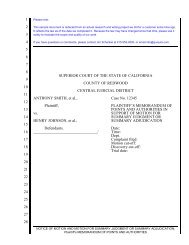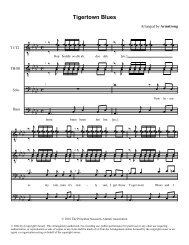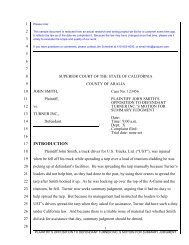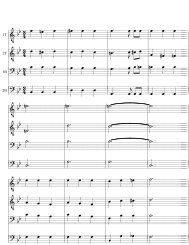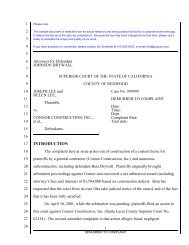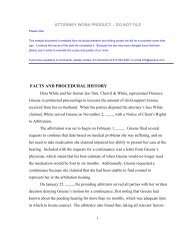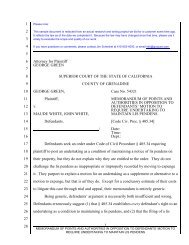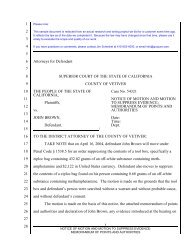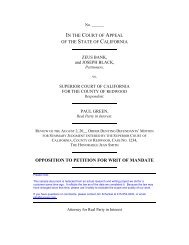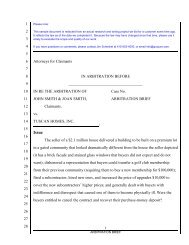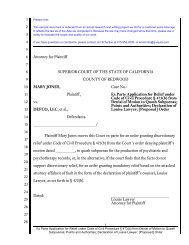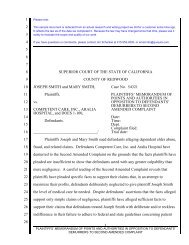Memo re probate issue - Quo Jure Corporation
Memo re probate issue - Quo Jure Corporation
Memo re probate issue - Quo Jure Corporation
Create successful ePaper yourself
Turn your PDF publications into a flip-book with our unique Google optimized e-Paper software.
Please note:<br />
This sample document is <strong>re</strong>dacted from an actual <strong>re</strong>search and writing project we did for a<br />
customer some time ago. It <strong>re</strong>flects the law as of the date we completed it. Because the law may<br />
have changed since that time, please use it solely to evaluate the scope and quality of our work.<br />
If you have questions or comments, please contact Jim Schenkel at 415-553-4000, or email<br />
info@quoju<strong>re</strong>.com.<br />
You have asked whether a surviving spouse with a <strong>probate</strong> homestead<br />
must pay either <strong>re</strong>nt or the property’s taxes and other cur<strong>re</strong>nt expenses. The<br />
surviving spouse need not pay <strong>re</strong>nt. Very little authority exists on whether she<br />
must pay taxes and other cur<strong>re</strong>nt expenses. The best answer is that the court has<br />
the disc<strong>re</strong>tion to <strong>re</strong>qui<strong>re</strong> the surviving spouse to do so.<br />
DISCUSSION<br />
1. The surviving spouse need not pay <strong>re</strong>nt.<br />
Until 60 days after the inventory is filed, the decedent’s surviving spouse<br />
and minor child<strong>re</strong>n a<strong>re</strong> entitled to keep possession of the family dwelling, the<br />
family wearing appa<strong>re</strong>l, household furnitu<strong>re</strong>, and the decedent’s other property<br />
exempt from enforcement of a money judgment. Prob. Code § 6500. After the<br />
inventory is filed, the court may, on petition, set aside a <strong>probate</strong> homestead for the<br />
surviving spouse or minor child<strong>re</strong>n. Id., §§ 6520, 6521. The court shall set apart<br />
the <strong>probate</strong> homestead only for a limited period, stated in the order, in no case<br />
beyond the surviving spouse’s lifetime or the child<strong>re</strong>n’s minority. Id., § 6524. The<br />
court may place those terms and conditions on the <strong>probate</strong> homestead that it<br />
deems proper. Id., § 6523(b)(2).<br />
– 1 –<br />
ATTORNEY WORK PRODUCT—DO NOT FILE
A surviving spouse occupying the family home under a <strong>probate</strong> homestead<br />
has no obligation to pay <strong>re</strong>nt to the estate. Robson v. Meder (1944) 66 Cal.App.2d<br />
47, 49-50. The statute’s policy “‘is protection of the family as a social unit in the<br />
home against demands of c<strong>re</strong>ditors, heirs and the family’s own improvidence.’”<br />
Id., at 49, quoting 11A CAL.JUR. 605. The survivor’s payment of <strong>re</strong>nt to the estate<br />
is inconsistent with this object. Id. The Legislatu<strong>re</strong> intended to provide for the<br />
family’s support by permitting the surviving spouse and any minor child<strong>re</strong>n to<br />
<strong>re</strong>main in the family home without obligation to the estate for its use. Id., at 49-50.<br />
The defendants in Meder possessed the homestead on order of the court, so the<br />
court’s ruling is not limited to the statutory homestead that lasts until 60 days<br />
after the filing of the inventory.<br />
2. The court can probably condition the surviving spouse’s use of<br />
the family home on payment of taxes and other cur<strong>re</strong>nt charges.<br />
A. The statutory scheme<br />
Once a court grants a petition for a homestead and sets apart property for<br />
it, the Legal Estates Principal and Income Law (“LEPIP”) governs the parties’<br />
rights to the extent applicable. Prob. Code § 6253, citing Civ. Code § 731, et seq.<br />
LEPIP applies “to all transactions by which a principal was established without<br />
the interposition of a trust on or after September 13, 1941, or is he<strong>re</strong>after so<br />
established.” Civ. Code § 731.01. For LEPIP’s purposes, principal is property that<br />
has been so set aside or limited by the owner the<strong>re</strong>of or a person<br />
the<strong>re</strong>to legally empowe<strong>re</strong>d that it and any substitutions for it a<strong>re</strong><br />
eventually to be conveyed, delive<strong>re</strong>d, or paid to a person, while the<br />
<strong>re</strong>turn the<strong>re</strong>from or use the<strong>re</strong>of or any part of such <strong>re</strong>turn or use is<br />
in the meantime to be taken or <strong>re</strong>ceived by or held for accumulation<br />
for the same or another person.<br />
– 2 –<br />
ATTORNEY WORK PRODUCT—DO NOT FILE
Id., § 731.02(a).<br />
LEPIP governs “the ascertainment of income and principal and the<br />
apportionment of <strong>re</strong>ceipts and expenses between tenants and <strong>re</strong>maindermen in all<br />
cases whe<strong>re</strong> a principal has been established without the interposition of a trust<br />
. . . .” Civ. Code § 731.04. A tenant is the person “to whom income is p<strong>re</strong>sently or<br />
cur<strong>re</strong>ntly payable, or for whom it is accumulated or who is entitled to the beneficial<br />
use of the principal p<strong>re</strong>sently and for a time prior to its distribution.” Id., § 731.02(c)<br />
(emphasis added). A <strong>re</strong>mainderman is the person ultimately entitled to the<br />
principal. Id., subd. (d). Thus the family home and any other property set aside for<br />
the surviving spouse as a homestead is the principal. The surviving spouse, who is<br />
entitled to its immediate beneficial use, is the tenant, and the heir, legatee,<br />
devisee, or beneficiary under a living trust, who will ultimately <strong>re</strong>ceive the<br />
property, is the <strong>re</strong>mainderman.<br />
LEPIP sets forth eleven categories of property, each with its own rules for<br />
allocating income and expenses. See Civ. Code §§ 731.05-731.15. Section 731.13<br />
appears to apply to an economically nonproductive <strong>probate</strong> homestead such as the<br />
family <strong>re</strong>sidence. It governs<br />
principal in the possession of a tenant [that] consists of <strong>re</strong>alty or<br />
personalty which for mo<strong>re</strong> than a year and until disposed of as<br />
he<strong>re</strong>inafter stated has not produced an average net income of at least<br />
1 percent per annum [(a)] of its inventory as fixed by the appraiser<br />
or appraisers <strong>re</strong>gularly appointed by the court or[,] in default<br />
the<strong>re</strong>of[, (b) of] its market value at the time the principal was<br />
established or [(c)] of its cost whe<strong>re</strong> purchased or otherwise<br />
acqui<strong>re</strong>d later . . .<br />
Id., § 731.13(a).<br />
But a further qualification to the application of § 731.13 is that the tenant must<br />
have “a duty to change the form of the investment as soon as a <strong>re</strong>asonable price,<br />
– 3 –<br />
ATTORNEY WORK PRODUCT—DO NOT FILE
not <strong>re</strong>p<strong>re</strong>senting an undue sacrifice of value, may be obtained and such change is<br />
delayed, but is made befo<strong>re</strong> the principal is finally distributed . . . .” Id. Because<br />
the surviving spouse has no such duty to “change the form of the investment,”<br />
the statute does not govern the <strong>probate</strong> homestead after all.<br />
LEPIP is not the clea<strong>re</strong>st statute on the books. The two quotations above<br />
from § 731.13(a) a<strong>re</strong> just portions of a single 150-word sentence. How its various<br />
phrases and clauses a<strong>re</strong> parallel with or modify each other is anyone’s guess. No<br />
courts have clarified LEPIP. Cf. Conservatorship of Wemyss (1971) 20 Cal.App 3d<br />
877, 882-883. Wemyss is the only case to have cited it and then just to <strong>re</strong>ject its<br />
application to conservatorships. See Id.<br />
B. The case law<br />
Only one California case has discussed a surviving spouse’s liability to pay<br />
taxes on a homestead exemption. See Estate of Vannucci (1980) 103 Cal.App.3d<br />
175, 182.The decedent and his wife, married late in life, owned a two-unit building<br />
as tenants in common; they lived in one flat and <strong>re</strong>nted out the other. He left his<br />
sha<strong>re</strong> to other <strong>re</strong>latives by will. The <strong>probate</strong> court orde<strong>re</strong>d that she stay in the one<br />
flat as a her <strong>probate</strong> homestead and that the <strong>re</strong>nt from the other go to his legatees.<br />
She would pay one half the taxes and other expenses and the legatees the other.<br />
The widow appealed on the grounds that those expenses, along with<br />
maintenance and utilities, would leave her with no financial benefit from the<br />
homestead. The court <strong>re</strong>jected both her math and her argument. Estate of<br />
Vannucci, 103 Cal.App.3d at 181-182. It pointed out that Morrison v. Barham<br />
(1960) 184 Cal.App.2d 267, 275-275, held that a former wife holding a homestead<br />
under a divorce dec<strong>re</strong>e had to pay the taxes on the land. Estate of Vannucci, 103<br />
– 4 –<br />
ATTORNEY WORK PRODUCT—DO NOT FILE
Cal.App.3d at 181-182. That homestead most closely <strong>re</strong>sembled a life estate, in<br />
which the life tenant has all the duties and obligations incident to the ownership,<br />
enjoyment, and profit from the land. Id., at 182, citing Morrison, 184 Cal.App.2d at<br />
273, 275. The Vanucci court did not explicitly follow Morrison. Instead, it held that<br />
the <strong>probate</strong> court, even if it had the disc<strong>re</strong>tion to <strong>re</strong>qui<strong>re</strong> the legatees to pay a<br />
g<strong>re</strong>ater sha<strong>re</strong> of taxes and costs, had not abused that disc<strong>re</strong>tion. Id. The widow still<br />
got a substantial monetary benefit from the homestead. Id.<br />
As the Morrison court pointed out, under the majority rule the possessor of<br />
the <strong>probate</strong> homestead must pay the taxes on it. See Morrison v. Barham, 184<br />
Cal.App.2d at 275, citing 5 Tiffany, LAW OF REAL PROPERTY (3d ed) § 1336, at<br />
152; 40 AM.JUR. 2d, Homestead § 147, citing, along with Morrison v. Barham, 184<br />
Cal.App.2d 267, In <strong>re</strong> Walberg’s Estate (officially known as Nordlund v. Dahlg<strong>re</strong>n)<br />
(1915) 130 Minn. 462, 153 N.W. 876; In <strong>re</strong> Baker’s Estate (1937) 156 Or. 256, 67<br />
P.2d 185, and Sargeant v. Sargeant (Comm’n App. 1929) 118 Tex. 343, 15 S.W.2d<br />
589. All of these cases but Morrison based their decisions on the surviving<br />
spouse’s vested right to occupy the land until death, so that the homestead not<br />
only <strong>re</strong>sembled a life estate but was one. Thus, in Minnesota, the <strong>probate</strong>homestead<br />
statute automatically c<strong>re</strong>ates a life estate in the surviving spouse,<br />
without any action by the court. Nordlund v. Dahlg<strong>re</strong>n, 130 Minn. at 466, 153 N.W.<br />
at 878. In Texas, the Constitution and statute “guarantee[ ]” a homestead, which<br />
is an estate in land. Sergeant v. Sergeant, 118 Tex. at 351, 15 S.W.2d at 593. In<br />
O<strong>re</strong>gon, the court has the duty, upon filing of the inventory, to set aside the<br />
homestead. Moody v. Baker (1933) 142 Or. 559, 562, 20 P.2d 1069, 1070; see also<br />
Carter v. Monarch (Ky.App. 1916) 188 S.W. 379, 380 (surviving spouse is life<br />
tenant who must pay tax); Hanna v. Palmer (1901) 194 Ill. 41, 44-45, 61 N.E. 1051<br />
– 5 –<br />
ATTORNEY WORK PRODUCT—DO NOT FILE
(homestead is a life estate, so tenant must pay taxes); Allen v. Russell (1898) 59<br />
Ohio St. 137, 145, 52 N.E. 121, 123 (<strong>probate</strong> homestead “owner” has a duty to pay<br />
taxes on it).<br />
In California, unlike in these other states, the surviving spouse has no<br />
vested right to a <strong>probate</strong> homestead. Estate of Murray (1982) 133 Cal.App.3d 601,<br />
605. Only the court’s order granting the <strong>probate</strong> homestead c<strong>re</strong>ates it. Id. The<br />
court grants the homestead privilege depending upon the conditions at the time of<br />
the petition. In <strong>re</strong> Estate of Wyss (1931) 112 Cal.App. 487, 497. In fixing its extent<br />
and duration, the court considers a variety of factors, including the surviving<br />
spouse’s needs, liens and encumbrances on the property, c<strong>re</strong>ditors’ claims, heirs’<br />
and devisees’ needs, and the decedent’s intent with <strong>re</strong>spect to the property. Prob.<br />
Code § 6523(a); Estate of Murray, 133 Cal.App.3d at 605.<br />
Courts in other states that grant a homestead exemption only as a<br />
temporary privilege have held that the surviving spouse is not obligated to pay the<br />
tax. See Crouse v.Crouse (Iowa 1935) 259 N.W. 443, 446 (privilege ends when<br />
surviving spouse <strong>re</strong>ceives distributive sha<strong>re</strong>); Branson v. Yancy (1827) 16 N.C. 77,<br />
82-83 (widow has no obligation to pay tax during year of temporary occupancy).<br />
But in California, unlike in these states, the <strong>probate</strong> homestead may survive the<br />
estate’s administration and even extend through the enti<strong>re</strong>ty of the surviving<br />
spouse’s life.<br />
The Crouse and Branson rule probably governs the temporary homestead<br />
as of right under § 6500. But, after the inventory, § 6523(b)(1) allows the court,<br />
upon setting aside a homestead, to set conditions upon the surviving spouse’s<br />
occupancy. One of those conditions could well be the payment of taxes or, if the<br />
court so orders, <strong>re</strong>nt.<br />
– 6 –<br />
ATTORNEY WORK PRODUCT—DO NOT FILE
CONCLUSION<br />
The surviving spouse has no obligation to pay <strong>re</strong>nt on the homestead,<br />
whether c<strong>re</strong>ated as of right on the decedent’s death or granted by the court after<br />
the inventory. She probably has no obligation to pay taxes on the initial<br />
homestead. Once the court sets aside a homestead after the inventory, it probably<br />
may condition possession on the payment of taxes and other expenses and maybe<br />
even on the payment of <strong>re</strong>nt.<br />
– 7 –<br />
ATTORNEY WORK PRODUCT—DO NOT FILE


